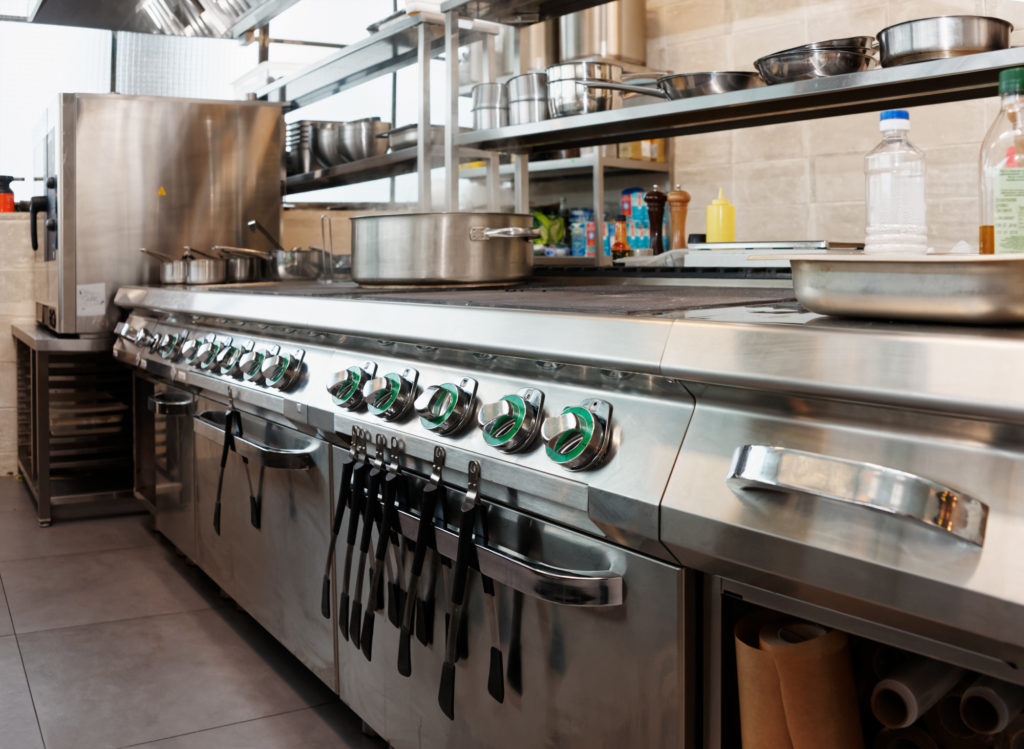What a great feeling! Your restaurant made headlines for its delicious food and top-shelf service. Customers are flooding in and raving about the experience. That’s far better than making headlines because a customer found rat droppings in her food! A dirty kitchen with bugs or rodents is a reputation killer. With the novel coronavirus topping the list of customer concerns, your kitchen needs to be cleaner than ever. Read on for some commercial kitchen cleaning methods for keeping things sparkling clean and germ-free.
Keep the Countertops Clean
A countertop may seem clean but that doesn’t mean it is. Countertops harbor bacteria so cleaning them often throughout the day is a good approach.
Remove everything from the countertops. Use an all-purpose cleaner that defends against viruses and bacteria.
Holding the spray bottle about 8 inches from the countertop, apply evenly across the surface. Let the countertops air dry.
Wipe down any items going back on the counters with a disinfectant so you don’t contaminate the freshly cleaned counters. Are the countertops tile? Use special tile cleaners that get the bacteria off the grout.
Hoods, Vents, and Grease Traps
Exhaust hoods and vents are home to loads of grease and grime. They’re a breeding ground for bacteria.
An excess of grease in the vents or hoods also restricts airflow in the kitchen. Wash out these areas every couple of months. If there’s a deep fryer in the kitchen, wash them every month.
Under-sink grease traps lead to clogged sewer lines if not cleaned at least once a week. Are the grease machines more than half full with once-a-week cleaning? Then clean them twice a week.
Commercial Kitchen Appliance Cleaning
Extend the life of your commercial kitchen appliances with thorough regular cleaning. Wipe down all appliances daily, including the small ones such as coffee makers and toasters.
Do a deep clean at least once a week on top of regular cleanings.
Use commercial kitchen cleaning products since they’re formulated especially for the job. Always read and follow the directions when using any cleaning product.
Refrigeration Units
The refrigerator is important to food safety. Wipe down the refrigerator with a disinfectant daily. The door handles are touched often, so it’s important they stay clean and free from germs.
Clean the condenser coils every few months with a brush and vacuum. Dust on the coils reduces the refrigerator’s efficiency.
Don’t use harsh chemicals inside the fridge or they could affect the taste of the food.
Fryers
Commercial deep fryers cook up some delicious food but they’re also messy. Boil out the deep fryer a couple of times a week.
Turn off the fryer and let the oil cool. Once cooled, drain the oil from the machine and then scrape down the walls and base. This removes the oil buildup.
Once you’ve removed the buildup, add water to the level line. Add an appropriate cleaner to the water.
Turn the fryer back on and bring the water to a boil. Let it boil for about 10 minutes. Boiling removes any remaining grease.
Once it’s done boiling, turn the machine off again and let the water cool. When the water is cool enough to handle, discard the water into a container. Don’t throw the water in the sink because the grease will clog the sewer line.
Using a cleaner and warm water, wipe down the interior once again. Then rinse well so there’s no cleaner left in the fryer.
Wipe down the outside of the fryer on a daily basis with warm water and a degreaser.
Ovens
Clean the interior of your oven every day! It doesn’t take that much time but it’s essential for keeping your oven in good working condition. Commercial ovens get dirty fast.
Take out the oven racks and soak them in hot water with mild dish soap. Rinse well and air dry before putting them back in the oven.
Wipe down the oven interior with the same solution. Avoid wiping the temperature probe and heating elements.
Scrub the cooktop burners every day as well. The burners and grates on the top need a more thorough cleaning once a month by soaking them in hot soapy water.
Look for grease buildup around the oven door and wipe it down with warm soapy water. Excess grease around the door causes an inefficient seal when the door is closed.
Commercial Kitchen Floor, Wall, and Ceiling Cleaning
Commercial kitchens are high-traffic areas. Grease makes its way everywhere, including up to the ceiling.
The floor needs cleaning every day. Clean the walls and ceiling every couple of weeks.
Food spills on the floor need immediate attention since they’re a danger for slip-and-fall accidents. If there are no obvious spills, the floors still need cleaning daily.
At the end of the day, vacuum or sweep up dirt, dust, and food debris. Then use a cleaning solution for mopping the floor.
Do a quick wipe of wall splatters every day and a thorough scrubbing of the walls twice a month. Use an appropriate degreaser. Airborne grease builds up on the walls and leaves an odor if not cleaned well.
The same goes for the ceiling. Use a soft cloth and degreaser for scrubbing the ceiling a couple of times per month.
Sinks
Keeping the sinks clean and grease-free is crucial in a commercial kitchen. Grease is a common reason for clogged sinks and sewer lines.
Use a disinfectant spray at the end of the day and wipe the entire sink and backsplash area. Use degreasers in the drain about once a month.
Commercial Kitchen Cleaning Tips for a Sparkling Kitchen
Commercial kitchen cleaning is essential for a thriving restaurant. Customers won’t eat twice in a restaurant that isn’t clean!
Daily cleaning is a must but don’t forget about deep cleaning once or twice a month too. Put your appliances on a cleaning schedule so you know what type of cleaning needs to be done and when it needs doing.

